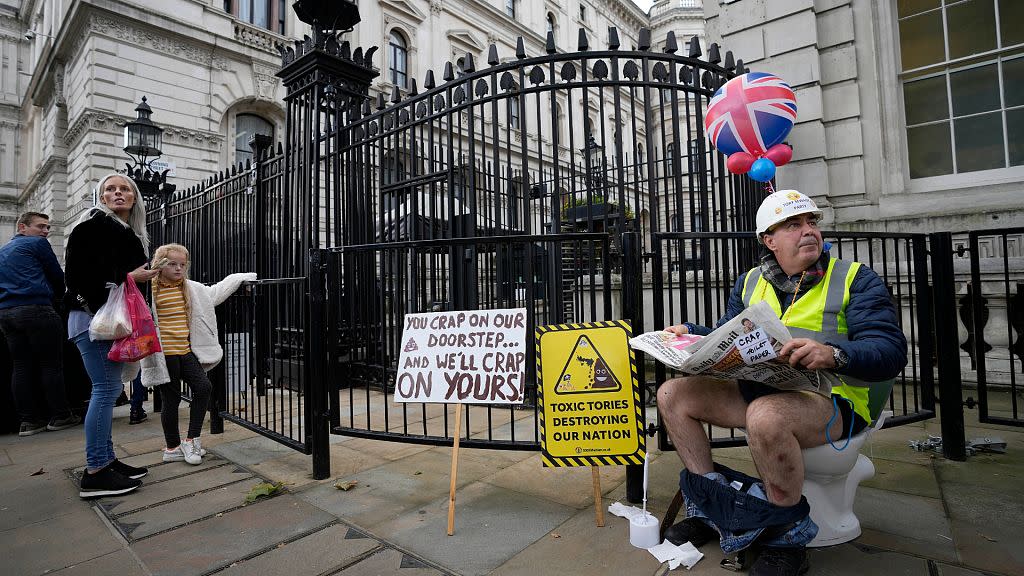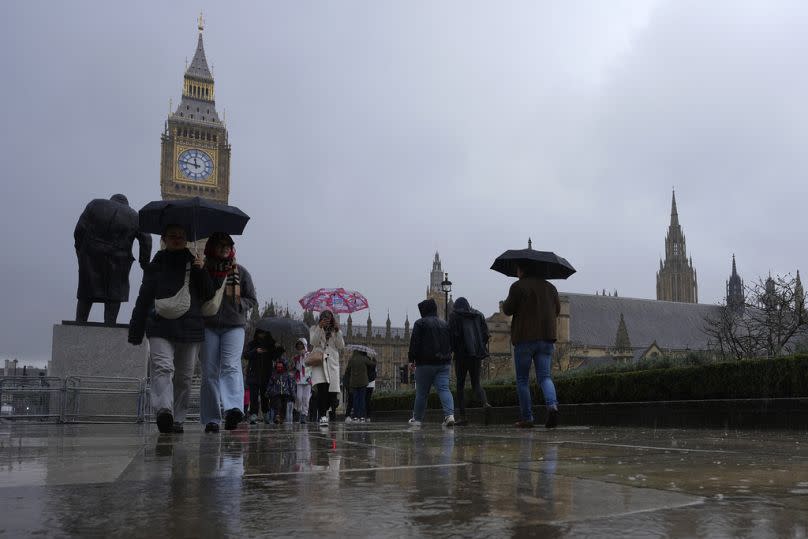Privatisation, extreme weather and politics: How Britain’s waterways became an ‘open sewer’

Anger is rising over the dumping of untreated sewage into the UK’s rivers and seas.
The situation attracted international attention at the end of March during the famous Oxford- Cambridge Boat Race.
Rowers were warned about potentially dangerous E. coli bacteria in the River Thames ahead of the event.
A combination of agricultural runoff and sewage spills now mean the UK is ranked among some of the worst countries in Europe for bathing water quality. Why have its rivers and seas ended up in this state?
Why has sewage pollution got so bad in the UK?
Many campaigners track the problem back to the privatisation of England’s water utilities in 1989. Companies were created as regional monopolies, split up by river catchment areas.
“The water industry as a whole was privatised in 1989 with zero borrowings,” says founder and chair of campaign group River Action, Charles Watson. Following the 2007-9 financial crisis cheap borrowing saw their debts grow to extraordinary levels.
“Today the water industry is carrying £60 billion [€70 billion] of borrowings.”
What's behind the 'unstoppable' disappearance of Austria's glaciers?
New US limits on toxic forever chemicals in drinking water expected to save thousands of lives
Campaigners say sizable profits were instead distributed to shareholders. Customer bills were also kept low leading to very little reinvestment in infrastructure or improvements to services.
Populations have grown since the 1980s and homes are more tightly packed in urban areas. More demand is now being placed on the existing infrastructure.
Add on top of this an increasing number of extreme weather events over the last decade - Storm Kathleen was the UK’s 11th named storm of this season.

This is a problem because, in much of the UK, sewage and rainwater are carried in the same pipes with both usually taken to sewage treatment plants. During heavy rainfall, however, the system is designed to overflow occasionally with excess wastewater discharged into seas and rivers.
“Basically when you have extreme weather or even just moderate rain, the system is faced with a dilemma, because the sewage handling capacity… it cannot cope with the demand,” Watson explains.
“You either allow sewage to back up into people's homes and businesses, back up the pipes - which is obviously completely and utterly unacceptable - or you open the other end of the pipe and release it into nature.”
Campaign groups say this underinvested and inadequate system is now being overloaded leading to more and more sewage spilling into rivers and seas.
“We’re seeing this on a daily basis,” says Louis Reddy, policy officer from environmental charity Surfers Against Sewage (SAS).
“Last year, there were 1,271 discharges of sewage into waterways a day across England alone. So we know that this is a huge systemic issue, that water companies are relying on waterways to deal with the sewage that they can't face treating.”
How much sewage is being spilt each year?
In 2023, sewage spills into England’s waterways more than doubled.
Recently released figures from the Environment Agency show that there were 3.6 million hours of spills compared to 1.75 million hours in 2022. The number of individual spills soared by 54 per cent - up from 301,000 in 2022 to 464,000 last year.
The industry body for sewerage companies, Water UK, blamed the “unacceptable” increase on heavy rain with 2023 being one of the wettest in England’s recorded history. It also said that, with 100 per cent of storm overflows now fitted with monitoring devices, more spills were documented.
The Environment Agency, however, has pointed out that water companies still have the responsibility to use storm flows legally regardless of heavy rain.
“We have a plan to sort this out by tripling investment which will cut spills by 40 per cent by 2030 - more than double the Government’s target,” Water UK said.
“We now need the regulator Ofwat to give us the green light so that we can get on with it.”
Are there regulations to stop sewage pollution?
There are two relevant regulators for sewage and the UK’s waterways. The Environment Agency (EA) is there to protect the environment and Ofwat manages the industry’s financial affairs and looks after the interests of consumers.
Over time the role of these regulators has become increasingly politicised, according to Watson.
What does the ECHR’s landmark ruling mean for human rights and climate change?
‘Two years to save the world’: UN climate chief calls for faster action and more finance
Government funding for the EA dropped by 50 per cent between 2009 and 2022 according to an analysis by Prospect, a trade union representing professionals in the public sector.
Mike Clancy, general secretary of Prospect, said in 2022 that it had left the agency in the “grips of a recruitment and resources crisis making it harder to hold polluters to account.”
“Unless this is fixed, sewage in bathing waters will only become more common,” he warned at the time.
“Companies have been regulating themselves over testing whether they're actually providing the service they're required [to],” Reddy says.
This has allowed them, she adds, to “underinvest and get away with it” without being held to account.
Charities and citizen scientists have been stepping in to monitor water quality and even provide the data needed to prosecute polluters. But, as Watson explains, it is “extraordinary” that it has got to the point where groups like River Action are sounding the alarm.
On the other side, Ofwat has attempted to protect consumers from rising bills - but water companies say price hikes are needed for necessary investment in infrastructure.
Thames Water, which serves almost a quarter of the UK’s population, is now drowning in over £15 billion (€17.5 billion) of debt. It is also facing several fines and regulatory investigations linked to leaks, sewage contamination and shareholder payments.
In March the company blamed Ofwat for not giving the “regulatory support” needed to turn the company around. It said the regulator had made Thames Water “uninvestable” and the company is now on the brink of collapse.
People power is pushing action on sewage pollution
A River Action survey from April 2023 found just 6 per cent of respondents were satisfied with the government’s efforts to protect rivers. Another by polling company Survation found that the government’s handling of sewage spills could influence the way more than half of British people vote in the upcoming general election.
“People are saying this is a real symbol of the poor infrastructure that we have in the UK,” Reddy says.
She emphasises that the driving force behind growing awareness of the problem has come from members of the public and campaign groups.
“They see that the local waterway - whether it's their favourite beach or their favourite place to walk their dog along a river - is regularly polluted by sewage.
“We’re hearing from people of all backgrounds who just really care about their local area and want to take action because it’s a real injustice to not be able to access clean water.”
The pollution is becoming a health issue too - SAS got over 2,000 reports last year of people telling them they got sick from getting in the sea.
Welsh water plant illegally spilled sewage near protected dolphin habitat for a decade
Where is the dirtiest water in the UK? This new map tracks sewage dumping
“It’s frankly disgusting but also a serious canary in the coal mine for this wider problem that is going on,” Reddy adds.
She points to a 2018 study which found that surfers in the UK were three times more likely to have antibiotic-resistant E. coli bacteria in their gut. They swallow 10 times more seawater than swimmers and harmful bacteria easily enter the coastal environment through sewage and waste pollution.
Sewage pollution has become an election issue
Public concern about sewage spills could cost Conservative MPs in riverside and coastal constituencies in upcoming local and general elections.
There have been 10 different Environment Ministers since the party first came to power in 2010 and a confusing raft of varying promises to clean up the UK’s waterways over the years. This means any new measures announced by the current government are unlikely to quell widespread worries.
Now, many other parties are putting forward their plans on how to tackle sewage spills as part of their election manifestos. The Labour Party, for example, has vowed to put water companies dumping sewage into UK waters under special measures claiming waterborne diseases have “put thousands of people in hospital”.
The Labour Party’s website says “Britain’s waterways [have] become an open sewer thanks to the Tories’ hands-off approach.”
Looking across the Channel, French authorities have spent billions of euros improving sewage and storm water treatment in an attempt to clean up the River Seine for Olympic swimming events this summer.
Whether or not the river ends up clean enough for athletes is currently up for debate. But President Emmanuel Macron and Paris Mayor Anne Hidalgo have enough confidence in the project that they have both promised to take a dip.
Back in London, it's difficult to imagine Prime Minister Rishi Sunak volunteering to do the same in the River Thames.


